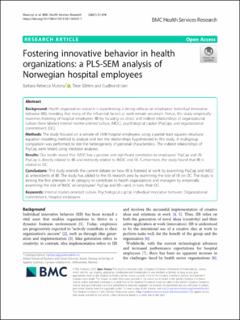Fostering innovative behavior in health organizations: a PLS-SEM analysis of Norwegian hospital employees
Peer reviewed, Journal article
Published version
Permanent lenke
https://hdl.handle.net/11250/3031102Utgivelsesdato
2021Metadata
Vis full innførselSamlinger
Originalversjon
10.1186/s12913-021-06505-1Sammendrag
Background:Health organization research is experiencing a strong refocus on employees’individual innovativebehavior (IIB), revealing that many of the influential factors at work remain uncertain. Hence, this study empiricallyexamines fostering of hospital employees’IIB by focusing on direct and indirect relationships of organizationalculture (here labeledinternal market-oriented culture, IMOC), psychological capital (PsyCap), and organizationalcommitment (OC).Methods:The study focused on a sample of 1008 hospital employees, using a partial least squares–structuralequation modeling method to analyze and test the relationships hypothesized in this study. A multigroupcomparison was performed to test the heterogeneity of personal characteristics. The indirect relationships ofPsyCap were tested using mediator analyses.Results:Our results reveal that IMOC has a positive and significant correlation to employees’PsyCap and IIB.PsyCap is directly related to IIB and indirectly related to IMOC and IIB. Furthermore, the study found that IIB isrelated to OC.Conclusions:This study extends the current debate on how IIB is fostered at work by examining PsyCap and IMOCas antecedents of IIB. The study has added to the IIB research area by examining the role of IIB on OC. The study isamong the first attempts in its category to contribute to health organizations and managers by empiricallyexamining the role of IMOC on employees’PsyCap and IIB—and, in turn, their OC.

